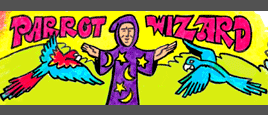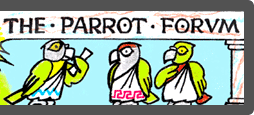Pajarita wrote:Welcome to the forum and thank you for trying to better this poor bird's sad life.
It's hard to tell from the picture because the light is not too good but it seems to me that you have a female turquoisine which is a species within the group called grass parakeets. Now, these birds are aviary so, in reality, they do not bond to people very deeply and, taking into consideration that this poor thing has been severely neglected for some many years, it will take A LOT of work, patience and time to tame it. Not that it cannot be done, mind you! We can give you lots of pointers on how to achieve this but it will be a project and half, that's for sure.
But this does not mean that you cannot improve its life in the meantime. The cage is completely inadequate (WAAAYYY too small), these birds are flighty and they need flight cages so they can flit from one branch (the cage also has the worst perches!) to another if there isn't enough room for it to fly (which would be the ideal situation). Please get her a nice flight cage, tall enough that the roosting perch is at your eye level when you are standing up and place it against a wall in a spot where it gets natural light from a window and set it up with natural tree branches (and don't worry if they are not straight or perfectly parallel to the floor and make sure there are different diameters from thin to a bit wider -these is good exercise for her feet and legs), just make sure the wood you are using is safe. If you cannot place it against a wall, drape some sort of material (large towel? a quilt?) on the back of the cage to create a fake wall (this makes them feel safe). Make sure her diet is the right one. Parakeets cannot be free-fed protein food but they can eat cooked whole grains mixed with veggies, accompanied by raw produce in the morning (leafy greens and fruit) with just one teaspoon of finch seed mix for dinner. If you have a room where she can be let out of her cage in a safe manner and you feed her correctly, she would go back to her cage on her own when you serve her dinner at dusk - and that's another thing, she needs to be kept at a strict solar schedule with, at least, 2 hours of dawn and dusk so her endocrine system is healthy.
Now, as to taming her. Do NOT put your finger next to her cage, do NOT put your hand in her cage if you can avoid it, do NOT offer her food from your fingers. You are invading her privacy and imposing something she doesn't yet want from you. The first thing you need to do is to show her that you can be trusted, that you will respect her wishes and privacy and that you are the bringer of good things only (food, water, light, company, treats, etc). The way to prove this to her is to spend as many hours as you can in the same room as she is just talking, singing, whistling to her but never stare at her, just act nonchalantly, do your own stuff (play video games, read, whatever) without concentrating on her and, every now and then, offer her a treat. I usually recommend a high value item which is usually protein but, going by what you told us, I am afraid she has been fed way too much protein for years so you will have to come up with something different (maybe a birdy cookie?), if there is nothing you can find that would tempt her, use a tiny piece of a millet spray. Offer the treat to her once and wait about 5 seconds, if she doesn't take it from your fingers (from outside the cage), stick it between the bars and walk away because this is not a reward or a bribe, it's a gift from you to her - a token of your desire for friendship. As time goes by, she will start looking forward to her treats (as long as you don't free-feed protein, of course) and one day, she will take it from your fingers after moving closer to the side of the cage where you are standing. This is the first step in establishing trust which, in turn, is the first step in a good long-term relationship. When you get to this point, we will tell you how to proceed further.
But, in all honesty, the very best thing you can do for this bird is to get her a large flight cage, change her diet (I would also give her a multivitamin/mineral supplement unless she has been eating pellets all along which are not good for these birds but they do have vitamins/minerals in them AND liver cleansers -because free-feeding protein messes up their liver something terrible) and get her a mate of her own species because no matter how hard we try, we can never make aviary birds happy living just with a human.
What an amazing reply! Thank you very much for the time you've put in to write all this down.
Just a few questions to clarify my doubts:
1. Is there a way to determine if it's a female or male? You sounded unsure about it and if I have to buy a mate for it, I need to be sure that it's a female so that I'll buy a male.
2. Does the mate need to be of the same species or can it be something similar/any kind of bird as long as it's of the opposite sex?
3. As far as the cage goes, would something like this be appropriate? I found nothing as tall as my eyes.

4. You've mentioned protein a lot, but I don't know if the bird has ever been fed that, it was always fed the bird food that you buy at the shop, so there are those seeds and that powder, I'm not sure about what it is exactly.
5. Should I keep the cage inside or outside on the balcony?
6. What kind of food is a "treat" for a bird? A carrot? A banana? A biscuit?
7. Is there a way to determine how old this bird is? If it's old, is it ok to buy a baby mate or does the mate need to be approximately of the same age?







